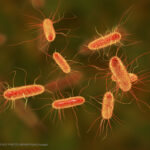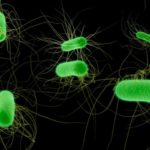The CDC says that seven pathogens cause 9.9 million illnesses every year in the United States. This estimate is used to allocate resources and prioritize interventions. The seven pathogens are Campylobacter, Clostridium perfringens, invasive Listeria monocytogenes, norovirus, Salmonella, Toxoplasma gondii, and Shiga toxin-producing E. coli (STEC). And those illnesses cause about 53,000 hospitalizations and 931 deaths. Norovirus caused the most illnesses, followed by Campylobacter, and Salmonella. Salmonella infections were the leading cause of death, with 238 every year, followed by Campylobacter with 197 deaths and norovirus with 174. The issue with this estimate is that public health reports are limited because not all people sickened by those pathogens seek medical care and … [Read more...]
Huntley High School E. coli Outbreak Sickens Six Students in Illinois
A confirmed Huntley High School E. coli outbreak has sickened at least six students in that school in Illinois, according to the McHenry County Department of Health. The Huntley Community School District 158 is working with the health department to respond to the Shiga toxin-producing E. coli (STEC) outbreak. That school is located at 13719 Harmony Road in Huntley. The first illness was identified on Sunday, September 17, 2023. At this time, officials do not know the source of the illnesses. The county is actively monitoring for potential cases, since E. coli is a reportable condition, and there are no other known cases in McHenry County outside of the school outbreak. School officials sent a letter to parents, students, and staff, telling them that they are taking the situation … [Read more...]
Raw Pet Food Is a Public Health Issue Because of E. coli Contamination
A study published in Microorganisms has found that feeding pets raw pet food comes with a risk of pathogenic bacteria, including Shiga toxin-producing E. coli (STEC), which can cause serious illness in humans and is a public health issue. The study evaluated commercially available raw meat-based diets (RMBDs) in Switzerland. These foods are made of uncooked raw muscle meats, organ meats, and the meaty bones of livestock or wild animals. They are mostly from the by-products of animals that are slaughtered for human consumption. The study looked at the occurrence of STEC isolated from commercially available raw pet food in Switzerland. In a recent study in the U.S., Shiga toxin-producing E. coli bacteria were identified in 4% of commercially available RMBDs. Studies demonstrating … [Read more...]
Tamoxifen May Fight Lethality of Shiga Toxin-Producing E. coli Bacteria
According to new research from the University of Texas at Austin's College of Pharmacy, the drug tamoxifen may help fight the lethality of Shiga toxin-producing E. coli (STEC) bacteria. That drug is already approved by the FDA for treatment of diseases such as breast cancer. Researchers think that tamoxifen may block the ability of the toxins to invade human cells. The researchers have published a paper called "Tamoxifen blocks retrograde trafficking of Shiga toxin 1 and 2 and protects against lethal toxicosis" in Life Science Alliance. Certain types of E. coli bacteria produce Shiga toxins, which enter red blood cells and destroy them. The cells then travel throughout the bloodstream until they get to the kidneys. There, they clog tiny tubes called glomeruli, which destroys … [Read more...]
Consumer Advisory Issued for Uncle John’s Apple Cider for E. coli
The Michigan Department of Agriculture and Rural Development issued a consumer advisory for Uncle John's Old Fashioned Apple Cider produced by Uncle John's Cider mill in St. Johns, Michigan because it may be contaminated with Shiga toxin-producing E. coli bacteria. A random sample collected by a government inspector tested positive for the pathogenic bacteria. No illnesses have been reported to date in connection with the consumption of this product. The recall is for about 1,200 gallons of cider produced on October 17, 2015. The cider was sold at the cider mill from the retail cooler, packaged in various sized plastic jugs with a sell-by date of October 30, 2015, or served directly to consumers by the cup as cold cider, frozen cider slushes, and hot cider from October 18 through … [Read more...]
Michigan E. coli Cases Linked to Unpasteurized Cider
The Health Department of Northwest Michigan, along with Community Health and the Michigan Departments of Agriculture and Rural Development are investigating a series of E. coli infections that may be associated with unpasteurized, unlabeled apple juice in Antrim County. Officials are collecting stool samples and samples of the cider to test for the outbreak strain of the bacteria. The cider was made by an unlicensed facility and was not labeled as unpasteurized. Public health officials warn that it's important to purchase cider from licensed facilities and vendors. Unpasteurized cider, along with raw milk and under-cooked meat, have been the cause of Shiga toxin-producing E. coli (STEC) bacterial outbreaks in the past. The FDA says that most juice sold in the U.S. is pasteurized. … [Read more...]
E. coli Outbreak at Saginaw Correctional Facility in Michigan
John C. Cordell, Public Information Specialist with the Michigan Department of Corrections told Food Poisoning Bulletin that there is an outbreak of STEC, or Shiga toxin-producing E. coli, at the Saginaw Correctional Facility. The facility is quarantined with no prisoner transfers, no group programming or prisoner visitation. So far, 89 prisoners and seven staff have been confirmed ill with the E. coli bacteria. Four prisoners have been hospitalized, but there are no cases of hemolytic uremic syndrome. The hospitalizations have been for dehydration. Most cases occurred from August 27 to August 30, 2012. The outbreak may be over, since no cases were identified on September 3 or 4, 2012. The facility may be able to return to normal operations at the end of this week, since the … [Read more...]
USDA Announces New Traceback Policy for Contaminated Beef
Dr. Elisabeth Hagen, USDA's Under Secretary for Food Safety, announced in a press conference on May 2, 2012 that the government is changing its traceback policy for contaminated beef that test positive for shiga-toxin producing E. coli bacteria (STEC). "Our keys goals are to strengthen our ability to protect consumers and to bolster prevention-based public safeguards," she said. "We are going to use traceback policies as a proactive measure, launching the investigations earlier to identify contaminated products before they reach consumers." Traceback is the path investigators follow to find out where the contaminated product came from, and to discover where bacteria were introduced into the product. The new policy will allow the USDA to begin traceback and investigations if … [Read more...]
Manganese May be Treatment for Shiga Toxin
The journal Science has published a study about using the mineral manganese to treat shiga toxin, one of the complications of E. coli infections. The study examined mice exposed to lethal doses of the toxin that didn't suffer any of the typical side effects when treated with manganese. Shiga toxin is produced by some E. coli strains. The infection is usually caused by eating undercooked contaminated ground beef, unpasteurized apple juice, contaminated water, raw milk, and alfalfa sprouts. Some person-to-person spread can take place in places such as nursing homes. The highest rates for infection are in children under the age of 5. Elderly people are also at high risk for this infection. This toxin can lead to complications that range from intestinal disease to kidney failure and … [Read more...]











